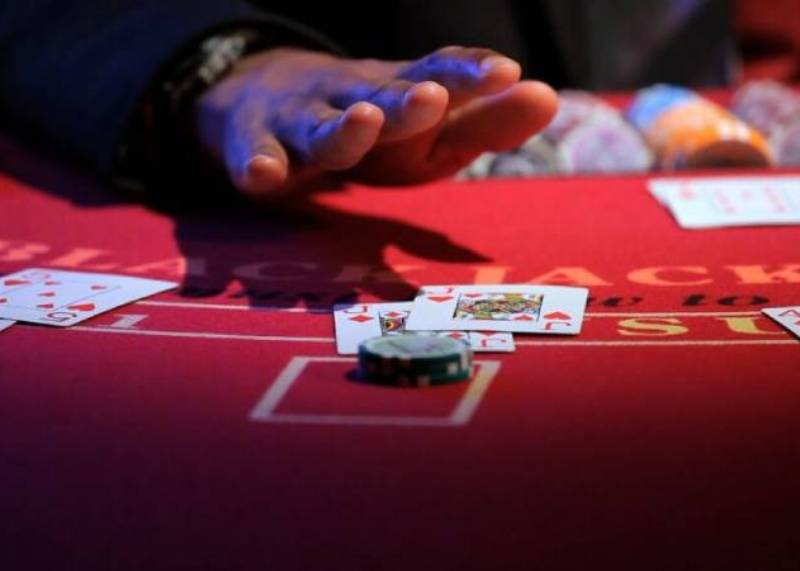When to Split in Blackjack
Pair splitting is a potentially advantageous move in blackjack that is frequently misapplied. Have you ever wondered when splitting is best or whether you should split a pair at all? Let’s delve deep into the logic of pair splitting to help you decide when to split in blackjack.

How to Play Blackjack
The goal of blackjack is straightforward: get a hand with a value of 21, or close to it, and beat the dealer without going bust! Cards two through nine have their face value; tens, jacks, queens, and kings are worth ten points, and the ace is worth one or eleven points (depending on the total). Blackjack variations include bonus side bets and different rules and may allow for additional moves such as doubling down or surrendering. To play blackjack at an online casino, you must create an account and make your first deposit.
What is Splitting in Blackjack?
Splitting is exactly what it sounds like! When a player is dealt two cards with the same value, they may be able to split the pair into two separate hands. If the player chooses to do so, he or she must place a wager equal to the original bet on the newly formed hand. Assume you placed a €1 wager, and your first two cards were a three of clubs and a three of diamonds, forming a pair. If you choose to split, you must place an additional €1 wager and play two new hands, each with a value of three and a €1 bet. You’ll then play your first hand (on the right) before moving on to the second.
Despite the straightforward logic of splitting, there is a method and strategy to be found here. Similar to surrendering a hand, splitting can be a strategic move in Blackjack Surrender. There are three logical reasons why you should consider splitting pairs, whether you play defensively or offensively:
- Offensive Strategy — When you believe you have a good chance of turning a losing hand into a winning one.
- Defensive Strategy – If you will lose your money, on average, by splitting your two cards.
- Risky Strategy — If you win more money on average.
When to Split Pairs in Blackjack?
The number of decks used, the game rules, house rules, initial cards, and the dealer’s upcard will all influence when you split pairs. Tables that allow doubling after splitting (DAS) are more advantageous to the player; as a result, you will split pairs more frequently. If you’re playing No Double After Split (NDAS) blackjack, you should use a more conservative pair splitting strategy. Because most online casinos offer multi-deck shoes, we’ll review the appropriate splitting strategies.
Split When
You Get Ace-Ace – With so many 10-point value cards in the deck, this pair could be your ace in the hole! Splitting two aces yields reasonable odds of hitting blackjack because an ace can be worth one or 11 points depending on the hand’s value. When you play your pair of aces as a single hand, you get either two or a soft 12, both of which are difficult hands to play, whereas split aces win with a 10-point card on the next hit. Remember that some players may only allow a single hit (drawing another card) after splitting aces and limiting doubling and resplitting.
You Get 8-8 – A single-hand total of 16 is problematic if you are dealt a pair of eights, as the likelihood of a push is relatively high if the dealer stands on 16. Instead of splitting and hitting, the player should split and hit, aiming for a hand value of 18 on both hands. Splitting two eights is to limit losses while improving the hand. A split pair of eights is expected to win if the dealer shows two through seven and to lose if the dealer shows eight through ace; however, splitting the eights is financially more advantageous in both scenarios, as the player is expected to lose less frequently than when playing a pair of eights in a single hand.
Don’t Split When
You Get 5-5 or 10-10 – If you are dealt a pair of tens (or two ten-point cards), you have a strong hand of twenty that is difficult to improve if you split and hit. A pair of fives yields ten, an excellent hand for doubling down on (if allowed). If you split a pair of fives, each hand will most likely result in a hand of 14-16, which is difficult to play.
You Get 4-4 – A pair of fours (eight points) is a good hand to aim for 18 with, similar to splitting eights. In addition, two separate four-point hands, like splitting fives, are relatively weak because they have a reasonable chance of ending up with problematic hands after a hit.
Aside from the dos and don’ts listed above, splitting other pairs is largely determined by the dealer’s upcard and whether the player is allowed to double down in blackjack after splitting. Here are some general guidelines for splitting DAS and NDAS tables:
Double After Split
- With 2-2, 3-3 and 7-7 — Split against the dealer’s two through seven.
- With 4-4 — Split on dealer’s upcard of five or six.
- With 5-5 and 10-10 — Never split.
- With 6-6 — If the dealer’s card is two through six.
- With 8-8 — Always, except for H17 and an ace upcard (in this case, split eights if surrender is not permitted).
- With 9-9 — Split if the dealer’s card is two through six, eight and nine.
- With ace-ace — Always split.
No Double After Split (if the dealer must hit on a soft 17)
- With 2-2 and 3-3 — Split against the dealer’s four through seven.
- With 4-4, 5-5 and 10-10 — Never.
- With 6-6 — Split if the dealer’s card is three through six.
- With 7-7 — If the dealer shows a card that is two through seven.
- With 8-8 — Always. Split on ace only if surrender is not permitted.
- With 9-9 — Split on dealer’s two through six, eight and nine.
- With ace-ace — Always.
How Splitting Affects the House Edge
Numerous factors can influence the house edge in blackjack, but splitting has no direct effect. Allowing doubling down after splitting, on the other hand, reduces the house edge by about 0.12 per cent. Resplitting aces, if allowed, reduces the edge by about 0.03 per cent. While splitting a pair does not reduce the house edge, it is a favourable move that may increase the likelihood of hitting one or two stronger hands rather than playing with a single, weaker one.
FAQ
What exactly is splitting in blackjack?
Splitting is dividing one hand into two when the dealer deals the player a pair (two cards of the same value).
When should you split pairs in blackjack?
Game rules, the number of decks used, which pair is dealt, which card the dealer shows, and whether or not the table allows doubling down after splitting all influence playing decisions. Investigate which circumstances are advantageous to the player, keep a handy table nearby, and don’t go bankrupt!
Does splitting affect the house edge?
No, but depending on their card and the dealer’s face-up card, players may use it to increase their chances of forming stronger split hands (upcard).
100% up to €500 or 5 BTC




